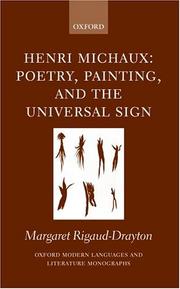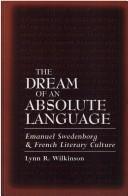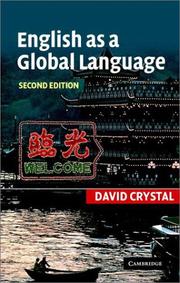| Listing 1 - 10 of 10 |
Sort by
|
Book
ISBN: 9048511240 9789048511242 905629590X Year: 2009 Publisher: Amsterdam Vossiuspers UvA
Abstract | Keywords | Export | Availability | Bookmark
 Loading...
Loading...Choose an application
- Reference Manager
- EndNote
- RefWorks (Direct export to RefWorks)
De interlinguïstiek bestudeert door de mens gemaakte internationale verkeerstalen. Het Esperanto (1887) is hiervan de bekendste en de enige die is uitgegroeid tot een taal van een wereldwijde gemeenschap die haar eigen literatuur, radioprogramma's en internetverkeer heeft, en in deze taal congressen organiseert. De ontwikkeling van de taal wordt niet gedirigeerd, maar is in handen van de verspreid wonende sprekers. Wim Jansen beschrijft in zijn oratie enkele spontane taalevoluties en gaat ook in op de attitude van taalgebruikers tegenover vermeende 'kunstgrepen'. De affectie die veel Esperanto
Esperanto. --- Language, Universal. --- Interlinguistics --- International language --- Language, International --- Language, World --- Universal language --- World language --- Lingvo internacia (Artificial language) --- Languages, Artificial

ISBN: 1281345946 9786611345945 0191535168 9780191535161 9780199277988 0199277982 6611345949 0199277982 9781281345943 1383042284 Year: 2005 Publisher: Oxford : Clarendon press,
Abstract | Keywords | Export | Availability | Bookmark
 Loading...
Loading...Choose an application
- Reference Manager
- EndNote
- RefWorks (Direct export to RefWorks)
Argues that Henri Michaux's ideas on what might constitute a universal language are central to an understanding of his works. This book explores the intricate relationships between word and image in his poetry and paintings, and his quest for a single, unifying language or sign.
Language, Universal. --- Interlinguistics --- International language --- Language, International --- Language, World --- Universal language --- World language --- Michaux, Henri, --- Criticism and interpretation. --- Michaux, H. --- Misho, Anri, --- Misho, Henri, --- Michaux, Henry, --- French literature --- Art, French --- Literary art.
Book
ISBN: 9781107611801 1107611806 9781139196970 1139196979 9781107414587 110741458X 1107386985 113989398X 1107390710 1107395518 1107387795 9781107387799 1322521441 Year: 2012 Publisher: Cambridge : Cambridge University Press,
Abstract | Keywords | Export | Availability | Bookmark
 Loading...
Loading...Choose an application
- Reference Manager
- EndNote
- RefWorks (Direct export to RefWorks)
David Crystal's classic English as a Global Language considers the history, present status and future of the English language, focusing on its role as the leading international language. English has been deemed the most 'successful' language ever, with 1500 million speakers internationally, presenting a difficult task to those who wish to investigate it in its entirety. However, Crystal explores the subject in a measured but engaging way, always backing up observations with facts and figures. Written in a detailed and fascinating manner, this is a book written by an expert both for specialists in the subject and for general readers interested in the English language.
Language, Universal. --- English language --- Communication, International. --- Social aspects --- Interlinguistics --- International language --- Language, International --- Language, World --- Universal language --- World language --- International communication --- World communication --- Communication --- Germanic languages --- English language in foreign countries --- World Englishes --- Sociolinguistique --- Anglais (langue) --- Mondialisation --- À l'étranger --- À l'étranger

ISBN: 0585089175 9780585089171 0791429261 9780791429266 0791429253 9780791429259 1438424078 Year: 1996 Publisher: Albany State University of New York Press
Abstract | Keywords | Export | Availability | Bookmark
 Loading...
Loading...Choose an application
- Reference Manager
- EndNote
- RefWorks (Direct export to RefWorks)
Language and languages --- French literature --- Language, Universal. --- Language, Universal --- Languages & Literatures --- Philology & Linguistics --- Interlinguistics --- International language --- Language, International --- Language, World --- Universal language --- World language --- Foreign languages --- Languages --- Anthropology --- Communication --- Ethnology --- Information theory --- Meaning (Psychology) --- Philology --- Linguistics --- Philosophy. --- History and criticism. --- Philosophy --- History and criticism --- Swedenborg, Emanuel, --- Swedberg, Emanuel --- スウェーデンボルグ, エマヌエル --- スヴェーデンボルイ, エマヌエル --- Contributions in philosophy of language. --- Influence. --- France --- Intellectual life --- Swedenborg, Emanuel
Book
ISBN: 128331312X 9786613313126 9027277230 9789027277237 9027245541 9789027245540 1556193629 9781556193620 Year: 1992 Volume: 67 Publisher: Amsterdam : Benjamins,
Abstract | Keywords | Export | Availability | Bookmark
 Loading...
Loading...Choose an application
- Reference Manager
- EndNote
- RefWorks (Direct export to RefWorks)
In this reader, 19 articles have been collected that bring out the central position of John Wilkins and his Essay Toward a Real Character, and a Philosophical Language (1668) in the history of ideas in 17th-century Britain.
Language, Universal. --- Linguistics --- Linguistic science --- Science of language --- Language and languages --- Interlinguistics --- International language --- Language, International --- Language, World --- Universal language --- World language --- History --- Wilkins, John, --- John, --- Wilkins, J. --- Great Britain --- Intellectual life --- Language, Universal --- Langue universelle --- Linguistique --- Histoire --- Grande-Bretagne --- Vie intellectuelle
Book
ISBN: 9027269599 9789027269591 9027228361 9789027228369 9789027228369 132220585X Year: 2014 Publisher: Amsterdam Philadelphia John Benjamins Publishing Company
Abstract | Keywords | Export | Availability | Bookmark
 Loading...
Loading...Choose an application
- Reference Manager
- EndNote
- RefWorks (Direct export to RefWorks)
The article focuses on the linguistic practices of international academic staff at the University of Copenhagen (UCPH) in the context of internationalization of higher education and the policy of parallel language use (PLU) at UCPH. Both Danish and English are foreign languages for the majority of the internationals at UCPH. Many see the academia at UCPH as an expat bubble, i.e. a community within a community with its advantages and challenges. Most respondents consider English as a general working language while they find Danish helpful in administrative communication and in everyday life.
English philology --- English language --- Norwegian language --- Language, Universal. --- Interlinguistics --- International language --- Language, International --- Language, World --- Universal language --- World language --- Bokmål --- Dano-Norwegian language --- Norwegian language (Bokmål) --- Norwegian language (Riksmål) --- Riksmål --- Scandinavian languages --- Germanic languages --- Germanic philology --- Research --- Influence on Norwegian. --- Foreign elements --- English.
Periodical
ISSN: 21698260 21698252 Year: 2014 Publisher: Abingdon, Oxfordshire, UK : Berlin ; Boston : [Beijing, China] : Routledge, Taylor & Francis, De Gruyter Mouton ; Foreign Language Teaching and Research Press (FLTRP)
Abstract | Keywords | Export | Availability | Bookmark
 Loading...
Loading...Choose an application
- Reference Manager
- EndNote
- RefWorks (Direct export to RefWorks)
Linguistics --- Language and languages --- Language planning --- Language, Universal --- Language spread --- Language planning. --- Language spread. --- Language, Universal. --- Linguistics. --- Globalization --- Linguistic science --- Science of language --- Interlinguistics --- International language --- Language, International --- Language, World --- Universal language --- World language --- Diffusion of language --- Language diffusion --- Spread of language --- Sociolinguistics --- Planned language change --- Foreign languages --- Languages --- Anthropology --- Communication --- Ethnology --- Information theory --- Meaning (Psychology) --- Philology --- Diffusion --- Spread --- Planning --- Applied linguistics --- Applied linguistics.

ISBN: 1107136970 0511078625 1280415339 0511179138 0511203055 0511326068 0511486995 051107705X 9780511078620 0511075510 9780511075513 9780511077050 9780511326066 9780511203053 9786610415335 6610415331 9781139196970 1139196979 9780521823470 0521823471 9780521530323 0521530326 3125335795 9783125335790 1107611806 9781107611801 9780511486999 0521823471 0521530326 9781107611801 Year: 2003 Publisher: Cambridge : Cambridge university press,
Abstract | Keywords | Export | Availability | Bookmark
 Loading...
Loading...Choose an application
- Reference Manager
- EndNote
- RefWorks (Direct export to RefWorks)
David Crystal, world authority on the English language, presents a lively and factual account of the rise of English as a global language and explores the whys and wherefores of the history, current status and future potential of English as the international language of communication. English has been lauded as the most 'successful' language ever, with 1,500 million speakers worldwide; but Crystal avoids taking sides and tells the story in a measured but engaging way, backed by facts and figures. This new edition of his classic book includes new material (on the vocabulary, grammar and pronunciation of New Englishes), footnotes, new tables, and a full bibliography. There are updates throughout. This is a book for anyone of any nationality concerned with English: teachers, students, language professionals, politicians, general readers and anyone with a love of the language.
English language --- Communication, International. --- Language, Universal. --- Interlinguistics --- International language --- Language, International --- Language, World --- Universal language --- World language --- International communication --- World communication --- Communication --- Germanic languages --- English language in foreign countries --- World Englishes --- Social aspects --- Communication, International --- Language, Universal --- 802.0 <100> --- 802.0 <100> Engels. Engelse taalkunde--Wereld. Internationaal. Alle landen gezamenlijk --- Engels. Engelse taalkunde--Wereld. Internationaal. Alle landen gezamenlijk --- #KVHA:Diachronie; Engels --- Sociolinguistics --- Foreign countries --- Communication [International ] --- Intercultural communication --- Language [Universal ] --- English-speaking countries --- Arts and Humanities --- Language & Linguistics
Book
ISBN: 3110330121 3110330490 Year: 2011 Publisher: De Gruyter
Abstract | Keywords | Export | Availability | Bookmark
 Loading...
Loading...Choose an application
- Reference Manager
- EndNote
- RefWorks (Direct export to RefWorks)
Diagrams are an essential part of the most diverse processes of communication and cognition. Indeed, today the production of all kinds of text (including this one) is mediated by diagrammatic tools to be found on computer desktops. Not surprisingly, then, diagrams have become the object of much historical and theoretical work. This book--volume 2 of the Proceedings of the 33rd International Wittgenstein Symposium--is dedicated to this quickly growing field of interdisciplinary research. It includes contributions from philosophy, sociology (space syntax), art history, and history of science. Historically, there is a focus on Otto Neurath and his famous visual language (ISOTYPE), while the new attempts at theorizing diagrams presented here are mainly inspired by Charles Sanders Peirce and Ludwig Wittgenstein.
Language, Universal --- Isotype (Picture language) --- Wittgenstein, Ludwig, --- Neurath, Otto, --- Peirce, Charles S. --- Interlinguistics --- International language --- Language, International --- Language, World --- Universal language --- World language --- Languages, Artificial --- Pasigraphy --- Peirce, Charles Sanders, --- Peirce, C. S. --- Pirs, Charlz S., --- Peirce, Charles Santiago Sanders, --- Pʻo-erh-ssu, --- Pʻo-erh-ssu, Chʻa-li-ssu, --- Purs, Charls, --- Пърс, Чарлс, --- Chaersi Sangdesi Piersi, --- 查尔斯·桑德斯·皮尔斯, --- Wei-tʻe-ken-ssu-tʻan, --- Wei-tʻe-ken-ssu-tʻan, Lu-te-wei-hsi, --- Wittgenstein, L. --- Vitgenshteĭn, L., --- Wei-ken-ssu-tʻan, --- Pitʻŭgensyutʻain, --- Vitgenshteĭn, Li︠u︡dvig, --- Weitegenshitan, --- Wittgenstein, Ludovicus, --- Vitgenshtaĭn, Ludvig, --- ויטגנשטיין, לודוויג --- 维特根斯坦, --- Wittgenstein, Ludwig Josef Johann,
Book
ISBN: 9004300872 9789004300873 9789004300170 9004300171 Year: 2015 Publisher: Leiden, Netherlands Boston, Massachusetts
Abstract | Keywords | Export | Availability | Bookmark
 Loading...
Loading...Choose an application
- Reference Manager
- EndNote
- RefWorks (Direct export to RefWorks)
From the late 18th century in the multi-ethnic Kingdom of Hungary, new language-based national identities came to dominate over those that had previously been constructed on legal, territorial, or historical basis. While the Hungarian language struggled to emancipate itself, the roles and functions of Latin (the official language until 1844) were changing dramatically. Latin held a different significance for varying segments of society, from being the essential part of an individual identity to representing an obstacle to “national survival”; from guaranteeing harmony between the different linguistic communities to hindering change, social and political justice. This pioneering volume aims to highlight the ways language debates about Latin and Hungarian contributed to the creation of new identities and ideologies in Central Europe. Contributors include Gábor Almási, Per Pippin Aspaas, Piroska Balogh, Henrik Hönich, László Kontler, István Margócsy, Alexander Maxwell, Ambrus Miskolczy, Levente Nagy, Nenad Ristović, Andrea Seidler, Teodora Shek Brnardić, Zvjezdana Sikirić Assouline, and Lav Šubarić
Language policy --- Latin language. --- Language, Universal. --- Language and languages --- National characteristics, Hungarian. --- Hungarian language. --- Linguistic minorities --- Language and history. --- History and language --- Linguistics and history --- History --- Minority languages --- Minorities --- Sociolinguistics --- Magyar language --- Finno-Ugric languages --- Hungarian national characteristics --- Classical languages --- Italic languages and dialects --- Classical philology --- Latin philology --- Glottopolitics --- Institutional linguistics --- Language and state --- Languages, National --- Languages, Official --- National languages --- Official languages --- State and language --- Communication policy --- Language planning --- Interlinguistics --- International language --- Language, International --- Language, World --- Universal language --- World language --- Political aspects. --- Political aspects --- Government policy --- Hungary --- Macaristan --- Vengerskai︠a︡ Narodnai︠a︡ Respublika --- Magyar Népköztársaság --- Ungern --- Magyar Tanácsköztársaság --- Hungarian Republic --- Magyar Köztársaság (Republic) --- Oungaria --- Unkari --- Ungarn --- Hongrie --- Ungaria --- Ungheria --- Hungría --- Magyarország (Republic) --- Maďarsko --- Węgry --- Vengrii︠a︡ --- Hongarije --- VNR --- V.N.R. --- Hungaryah --- Hungari --- Hŏnggari --- Ungarii︠a︡ --- Republic of Hungary --- Hongaria --- Hongarye --- Republiek van Hongarye --- Macarıstan Respublikası --- Венгрыя --- Venhryi︠a︡ --- Mađarska --- Republika Mađarska --- Унгария --- Унгарската република --- Ungarskata republika --- Hongria --- República d'Hongria --- Republikang Unggaro --- Unggriya --- Mad̕arská republika --- Republica Ungrese --- Hwngari --- Gweriniaeth Hwngari --- Republik Ungarn --- Ungari --- Ungari Vabariik --- Ουγγαρία --- Δημοκρατία της Ουγγαρίας --- Dēmokratia tēs Oungarias --- República de Hungría --- Hungario --- Hungarujo --- Hungara Respubliko --- Hungaria --- Hungariar Errepublika --- Hungariako Errepublika --- Tjóðveldið Ungarn --- République de Hongrie --- Ungáir --- Poblacht na hUngáire --- Ungaar --- Pobblaght ny h-Ungaar --- 헝가리 --- Hunakalia --- Republik Hongaria --- Ungverjaland --- Lýðveldið Ungverjaland --- הונגריה --- אונגארן --- Мажарстан --- Mazharstan --- Мажарстан Республикасы --- Mazharstan Respublikasy --- Венгрия --- Венгрия Республикасы --- Vengrii︠a︡ Respublikasy --- Jamhuri ya Hungaria --- Madjaristan --- Repúvlika de Madjaristan --- רפובליקא דא מאגיאדיסטאן --- מאגיאדיסטאן --- Маджар --- Madzhar --- Маджар Республика --- Madzhar Respublika --- Respublica Hungarica --- Ungārija --- Ungārijas Republika --- Vengrija --- Vengrijos respublika --- Ungaïa --- Ungri --- Унгарија --- Република Унгарија --- Republika Ungarija --- Ungerija --- Hanekeria --- Унгар --- Ungar --- Tlācatlahtohcāyōtl Hungria --- Hongaarse Republiek --- ハンガリー --- Hangarī --- Hungrii --- Republikken Ungarn --- Ongria --- Republica d'Ongria --- Vengriya --- Vengriya Respublikasi --- Republika Węgierska --- República da Hungria --- Republica Ungară --- Republica Ungaria --- Венгерская Республика --- Vengerskai︠a︡ Respublika --- Lepulika o Hungary --- Republika e Hungarisë --- Unghirìa --- Madžarska --- Republika Madžarska --- Madźary --- Мађарска --- Република Мађарска --- Unkarin tasavalta --- Republiken Ungern --- Unggarya --- Republika ng Unggarya --- Majarstan Jȯmḣu̇rii︠a︡te --- Majoriston --- Macaristan Cumhuriyeti --- Угорщина --- Uhorshchyna --- Мадярщина --- Madi︠a︡rshchyna --- Угорська Республіка --- Uhorsʹka Respublika --- Oгорська Республіка --- Ohorsʹka Respublika --- Ongiri --- Oonguri --- Republik bu Oonguri --- Honharije --- Vengrėjė --- Vengrėjės Respoblėka --- 匈牙利 --- Xiongyali --- 匈牙利共和國 --- Xiongyali gong he guo --- Xiongyali Gongheguo --- Austro-Hungarian Monarchy --- Civilization --- Intellectual life --- Magyar Republic --- Ongaria --- Language and languages Political aspects --- Minoritized languages --- BNUU --- БНУУ --- Bu̇gd Naĭramdakh Ungar Uls
| Listing 1 - 10 of 10 |
Sort by
|

 Search
Search Feedback
Feedback About UniCat
About UniCat  Help
Help News
News